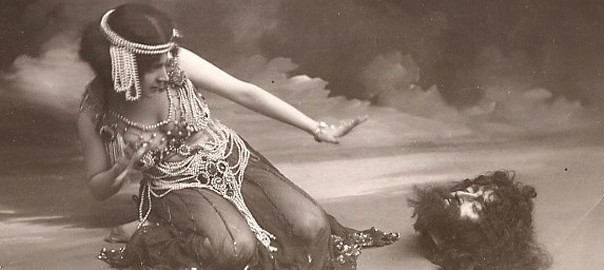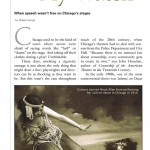This article by Robert Loerzel originally appeared in Playbill magazine in March 2010.
Chicago used to be the kind of town where actors were afraid of saying words like “hell” or “damn” on the stage. And taking off their clothes during a play? Unthinkable.
These days, smoking a cigarette is just about the only thing that might draw a fine; playwrights and directors can be as shocking as they want to be. But this wasn’t the case throughout much of the 20th century, when Chicago’s theaters had to deal with censors from the Police Department and City Hall. “Because there is no national law about censorship, every community gets to create its own,” says John Houchin, author of Censorship of the American Theatre in the Twentieth Century.
In the early 1900s, one of the most controversial shows was Salomé, an Oscar Wilde play that Richard Strauss adapted as an opera. Based on a story from the Bible, Salomé gave theaters a chance to present a striptease, which the title character performs as she demands that her father, King Herod, bring her the head of the prophet Jokanaan. In 1908, the Chicago Tribune criticized Lotta Faust’s Salomé dance at Chicago’s Garrick Theatre, complaining, “Her undulation becomes more riotous as the dance continues.” Police Chief George Shippy went to the theater the next night to check it out for himself, but he didn’t see anything wrong. “The dancer wore flesh-colored tights,” he said. “Her back was not bare, as has been said … The dancer did not wriggle nor posture improperly.” But when one of the most famous Salomé dancers, Maud Allan, tried to perform in Chicago in 1916, city officials stopped the show. “Salomé emerges at the same time as contemporary dance,” said Houchin, chairman of the theater department at Boston College. “It’s part of a general issue of showing women on stage. It breaks through a whole lot of barriers pretty quickly.”
In 1935, the Chicago police censor allowed Tobacco Road to open at the Selwyn Theatre (located where the Goodman Theatre is today). Critics praised this play about poor white sharecroppers in rural Georgia — “a priceless contribution to American drama,” the Chicago Herald-Examiner asserted — but Mayor Edward Kelly was outraged when he saw it. “It is an insult to decent people,” he claimed. “The language throughout is utter profanity and vulgarity. There is not a redeeming line or gesture in the whole production.” Kelly revoked the Selwyn Theatre’s license.
Erskine Caldwell, author of the novel Tobacco Road, happened to be in Chicago at the time. He insisted that his book and playwright Jack Kirkland’s stage version of it were “no more profane than everyday life.” The show’s star, Henry Hull, admitted that the play was vulgar, but he added, “So is life in the raw. If it is a play unfit for Chicago people to see, then the Bible is an unfit book for them to read.”
The producers of Tobacco Road sued the city, but they lost their case on appeal. So they took their show on the road to Milwaukee. The mayor of that city sat in the audience on opening night, laughing approvingly at all the jokes. Tobacco Road was not produced again in Chicago until 1972.
In 1948, Chicago censors demanded the removal of offensive dialogue from Thomas Heggen and Joshua Logan’s play about the U.S. Navy, Mister Roberts. Later that year, they banned Jean-Paul Sartre’s The Respectful Prostitute, but they changed their minds later and let it open.
The city did not change its policy on censorship in the 1960s, but it seemed the police were letting theaters get away with a lot more. “In recent years we have heard all the old four-letter words that used to be considered off limits,” Tribune critic William Leonard wrote in 1968, “and we have witnessed ladies with bosoms just as devoid of décolletage as any of the damsels in Las Vegas or San Francisco.”
The real test came when the musical Hair arrived Chicago after a successful and controversial run in New York. Hair’s producer, Chicago native Mike Butler, knew how to deal with censors. “He just had an army of lawyers, and anytime they were not granted a license, he took them to court,” Houchin says. “And he got a couple of Supreme Court decisions.” When the cast of Hair briefly stood naked on the stage of the Shubert Theatre (now the Bank of America Theatre) in October 1969, the police were nowhere in sight. The age of censorship in Chicago theater was over.



